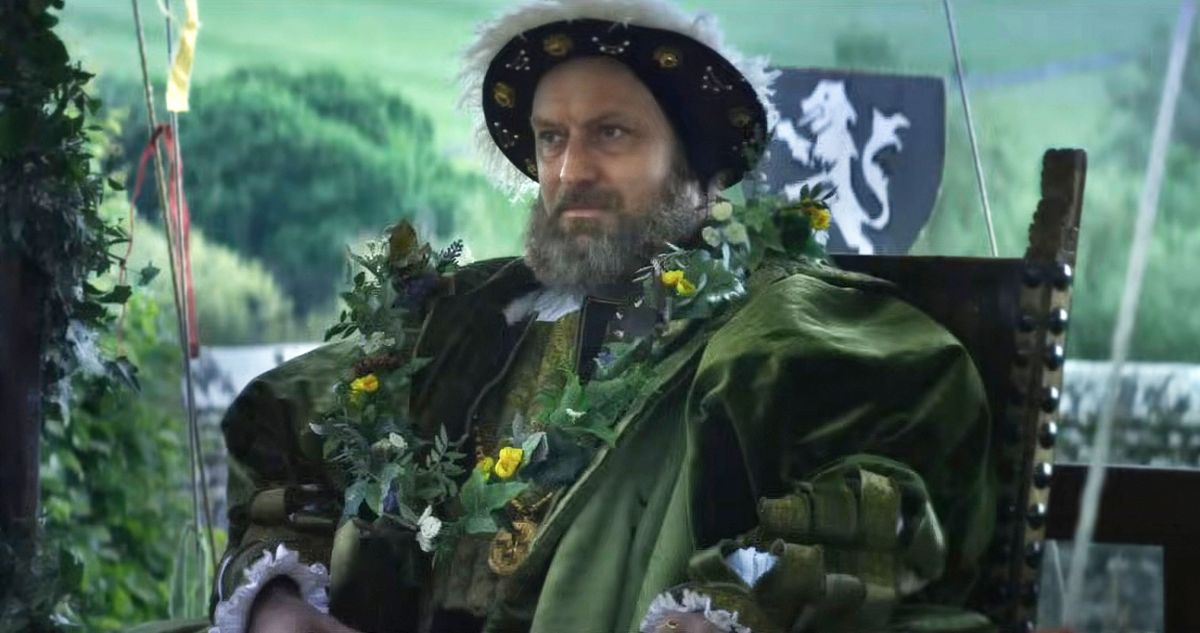Photo: Roadside Attraction/Everett Collection
By most accounts, Katherine Parr, the sixth and final wife of Henry VIII, was a well-educated and independent-minded woman who published books of translation and occasionally ran afoul of the king’s more distrustful toadies. She probably wasn’t quite the girlboss feminist Alicia Vikander plays in Karim Aïnouz’s Firebrand, secretly in alliance with heretics and revolutionaries and frantically conspiring behind the monarch’s back, but no matter — movies need not be strictly factual, and in a world where Six exists, so can Firebrand. If only the film were a little more convincing.
Based on Elizabeth Fremantle’s 2013 novel Queen’s Gambit, Firebrand introduces Katherine during her period as regent, controlling the throne while Henry (Jude Law) is off fighting the French. She’s making military and financial decisions while also going off to watch the fiery preaching of her old dear friend Anne Askew (a memorably screamy Erin Doherty), who rails against the divine power of monarchs and loudly calls for a people’s revolution. The fear and sadness that falls across Katherine’s face when she hears the king is returning from his military campaign indicates that her marriage to Henry wasn’t one based around love or loyalty.
As Henry, Law is a galactic and mercurial presence — alternately preening and embittered and needy and contemptuous but always very loudly so. Still, we can feel the charisma. He’s a monster, but we understand how this man held the throne for nearly four decades. The size of his personality is matched by the width of his torso; Aïnouz keeps his camera close to the characters so that Henry always takes up an enormous amount of space, both physically and emotionally. Even his infected, pus-filled leg seems like an extension of the spiritual rot that seems to spread wherever he goes.
The Brazilian Aïnouz is best known for earthy, heated melodramas like The Invisible Life of Eurídice Gusmão (2019) and Madame Satã (2002). This is his first English-language film, but he hasn’t tempered his style too much: The depravity and frenzy of the court clearly appeals to a director who’s always been fascinated by the animal urges of humans. He gets our baseness — he loves our baseness — and on one level, that serves him well with this tale of incessant royal intrigue.
And yet, it might not quite have been the right approach for a movie like this, which plunges us headlong into this busy, hectic world but doesn’t quite give us much context or reason to care about any of it. We struggle to keep up for much of Firebrand, a film that rewrites history but doesn’t bother to stop and explain what it’s actually saying. And while the script and the story spend a lot of time with Katherine, the movie doesn’t let Katherine herself breathe. Vikander keeps busy, in a constant state of agitation, but it’s mostly a one-note performance of a one-note character, lacking much imagination or vitality.
There’s a lot jam-packed into this movie, but it’s in such a rush to get through it all and to not bore us that it … well, it bores us. We’re lost, and we’re clearly not supposed to be. Characters and subplots flit by, conspiracies are breathlessly mentioned, and the whole thing winds up with a very silly nod to the future reign of Queen Elizabeth I (Henry’s daughter, much fussed over by Katherine Parr). The silliness isn’t even the problem. If anything, the whole movie probably should have been sillier, a fact that Law, with his broad, energetic performance, seems to get. At one point, about half an hour in, when Henry took to his harpsichord and tore into a raucous rendition of “Pastime With Good Company” (an actual song, and a very popular one, composed by the real Henry VIII), I briefly entertained the notion that the movie might turn out to be a musical. Alas, no such luck. And if Firebrand doesn’t know what kind of movie it wants to be, what hope could there be for the rest of us?















